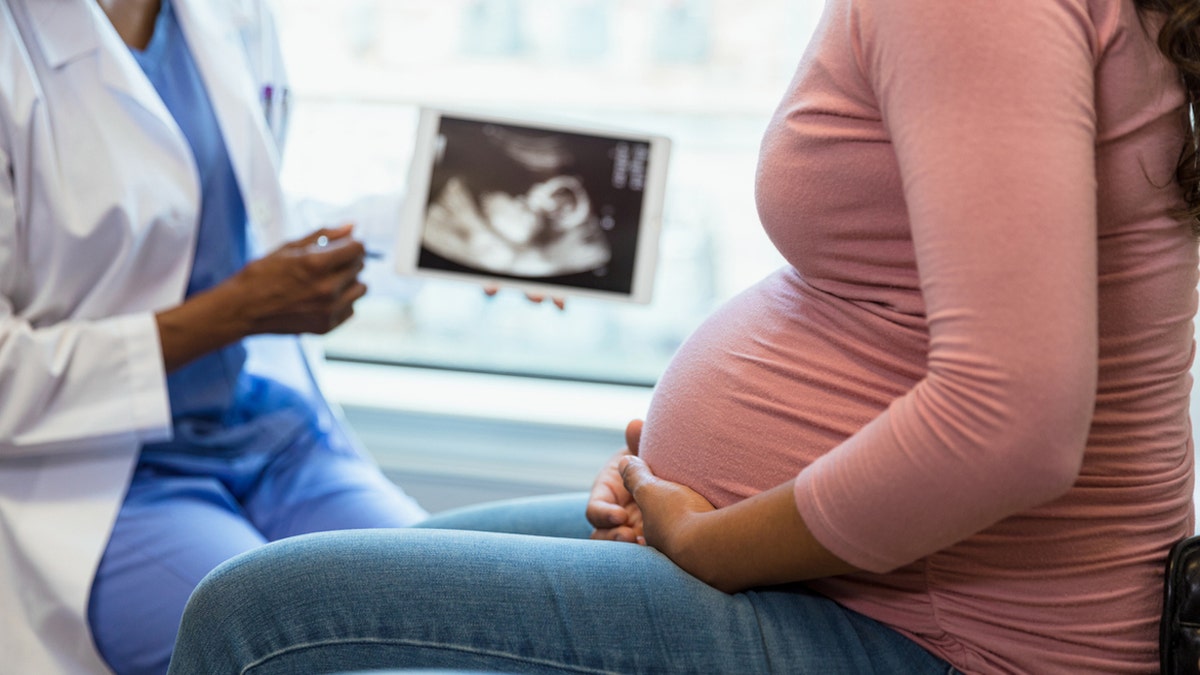Army captain serving in Iraq surprises pregnant wife with his early return hours before she gives birth
U.S. Army Captain Harold Rahming arranged an early return from his deployment in Iraq, so he could be present for his pregnant wife, Cara Rahming, before she gave birth to their firstborn in Illinois.
Many women experience a variety of symptoms during their pregnancies.
These may include nausea, fatigue, swollen feet and what’s been referred to as "pregnancy nose."
This unusual symptom is known to change the shape, size or width of a woman’s nose during a pregnancy.
The term has been trending on TikTok with more than 24 million views on videos discussing the topic.
One video posted by user Reece Wood (@tyreecewood1) received 15.9 million views after she showed photos of her face before and during pregnancy.

A TikTok video posted by user @tyreecewood1 went viral after she posted about her "pregnancy nose" transformation. (@tyreecewood1/TikTok)
Wood, who is based in Minnesota, told Fox News Digital that the change in her nose came as a "huge shock."
"Pregnancy affects each person differently."
"No one warns you about it and just overnight my nose doubled in size," she said.
"I couldn’t breathe the remainder of my pregnancy!"
POSTPARTUM DEPRESSION AMONG BIRTH MOMS: HOW WOMEN ARE BREAKING THE STIGMA
The video stirred conversation on the app, with many users sympathizing with Wood while also wondering how "pregnancy nose" happens in the first place.
"A lot of women have thanked me for my video because it made them feel seen and that’s really important to me," Wood added.
"I wish I would’ve had that while I was going through it," she also said.
Dr. Lauren Demosthenes, senior medical director at Babyscripts, a virtual maternity care company, told Fox News Digital via email that a spike in estrogen causes the dilation of blood vessels — including mucous membranes of the nose.
HORMONAL BIRTH CONTROL RAISES BREAST CANCER RISK SLIGHTLY: STUDY
"This may cause the nose to be a little bit swollen," said South Carolina-based Demosthenes.
"Also, pregnant women can begin to have some facial swelling later in pregnancy, which may cause the nose to look a little larger," she added.

New mom Megan Ferro of South Carolina said she experienced "pregnancy nose." Photo comparison from March 2022 (left) to Dec. 18, 2022 (right) while in labor with her son, Easton Ferro. (Megan Ferro)
Liesel Teen, a labor and delivery nurse and founder of Mommy Labor Nurse, an online resource for expectant parents, told Fox News Digital by email that while pregnancy nose is not an actual medical term or condition, the symptom can be "pretty darn noticeable" in some pregnant women.
Teen, of Raleigh, North Carolina, reiterated that elevated hormone levels during pregnancy lead to increased blood flow, sometimes showing up in the nose.
CHEMICALS IN WATER AND HOUSEHOLD OBJECTS COULD REDUCE CHANCES OF PREGNANCY, LIVE BIRTHS: NEW STUDY
"Pregnancy affects each person differently," she said. "No two pregnancies are exactly the same, so the same person might have totally different experiences in different pregnancies."
She continued, "There are dozens (or more) symptoms that women can experience during pregnancy, but it’s uncommon for someone to experience ALL of them."

Liesel Teen is a labor and delivery nurse and the founder of Mommy Labor Nurse, an online resource for pregnancy. "Pregnancy nose" most commonly tends to show up toward the end of a pregnancy, she noted. (Liesel Teen)
Teen explained that everybody "responds differently to hormones, so not all women will experience this lovely phenomenon during pregnancy."
She said that pregnancy nose most commonly tends to show up toward the end of a pregnancy, as blood volume and overall swelling increase; it generally resolves post-delivery.
"Blood vessels in your nose are fragile and break easily – this coupled with increased blood flow makes nosebleeds pretty common."
Demosthenes also said that pregnancy nose is a "temporary condition," which will normalize along with estrogen levels.
"It’s hard to say exactly when, but during the first weeks postpartum, things should return to normal," she said.

Elevated hormones during pregnancy can cause a variety of symptoms, doctors say. (iStock)
Nosebleeds may also be a common symptom for pregnant women due to hormones, Teen mentioned.
"Hormone changes and increased blood flow to certain places in your body during pregnancy put you at an increased risk for nosebleeds during pregnancy," she said.
CLICK HERE TO SIGN UP FOR OUR HEALTH NEWSLETTER
"The blood vessels in your nose (just like the ones throughout your body) expand during pregnancy because of the additional pressure from an increased volume of blood," she continued.
"Blood vessels in your nose are fragile and break easily — this coupled with increased blood flow makes nosebleeds pretty common," she added.

"Pregnancy affects each person differently," Teen said to Fox News Digital. (iStock)
Although there is no way to prevent pregnancy nose from occurring, there are several methods to reduce the swelling should it occur.
This includes staying hydrated by increasing water intake, limiting sodium consumption and keeping extremities — especially legs and feet — elevated.
CLICK HERE TO GET THE FOX NEWS APP
Pregnant women should take breaks from standing for long periods of time, or wear compression socks and comfortable footwear if they need to stand for a long period of time.











































